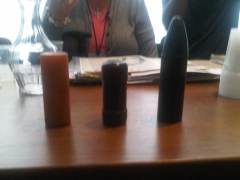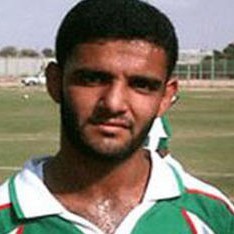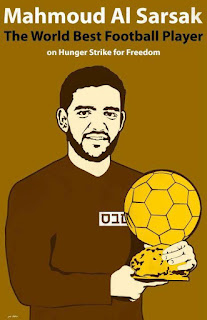« Madame
la Ministre, ne prenez pas mon mari en otage... »
Luk
Vervaet
Oum
Maryam est Bruxelloise de naissance. Elle est mère de cinq enfants,
dont l'ainée a 15 ans. C'est en assistant à ses procès et en le
visitant en prison, qu'elle a connu Nizar Trabelsi. Le couple a
décidé de se marier. Nadia,
l'amie de toujours d'Oum Maryam, et moi-même ont été sollicités
et ont accepté d'être les témoins légaux. Mais jusqu'à présent, les autorités belges
ont tout fait pour que ce mariage ne puisse avoir lieu.
Si
je vous en parle, c'est parce que ça illustre ce que vivent des
personnes auxquelles l'état belge a déclaré une guerre sans fin et
a quasiment ôté les droits les plus élémentaires.
Nizar
Trabelsi a bientôt fait onze ans de prison. Soit un an de plus que
la peine maximale de dix ans à laquelle il avait été condamné
pour avoir eu le plan d'une attaque contre la base militaire de
Kleine Brogel. Attaque qui n'a jamais eu lieu.
Voici
le récit d'une femme qui l'attend depuis des mois. Aujourd'hui elle
a décidé de briser le silence.
« Attendre »
J'attends sa libération depuis septembre 2011.
A
ce moment là, il avait fait ses dix ans de prison ferme, fond de
peine, jusqu'au dernier jour.
Une
assitante sociale envoyée par le tribunal a inspecté ma maison pour
voir si tout était en ordre. Si je pouvais bien l'acceuillir quand
il sortirait. Ils m'ont dit que c'était positif. Que c'était bien.
Et
puis, il y a eu la décision d'ajouter six mois de prison
supplémentaires, une punition pour un incident en prison.
Puis, ils ont ajouté trois mois de prison parce qu'il n'avait pas
payé une ammende. Enfermer quelqu'un pour trois mois pour une
ammende de 5550 euros non-payée, c'est une peine qu'on n'applique
pour personne en Belgique. Sauf pour Nizar Trabelsi.
Le 10 mars 2012, Nizar avait purgé toutes
ses peines, y compris les neufs mois de prison supplémentaires.
La
maison était prète pour l'acceuillir. Nous avons tout repeint,
tout arrangé. Nizar et moi avions déjà le projet d'amener les
enfants ensemble à l'école.
Psychologiquement, c'est dur. Il y a eu le stress. J'avais peur que des journalistes se pointent devant ma porte quand il sortirait de la prison. Pendant longtemps, j'ai eu peur pour mes enfants, ma famille, mes frères et soeurs qu'ils auraient à supporter des conséquences de tout ça.
Psychologiquement, c'est dur. Il y a eu le stress. J'avais peur que des journalistes se pointent devant ma porte quand il sortirait de la prison. Pendant longtemps, j'ai eu peur pour mes enfants, ma famille, mes frères et soeurs qu'ils auraient à supporter des conséquences de tout ça.
A partir du 10 mars, les autorités ont commencé à dire qu'elles allaient maintenir
Nizar en détention en attendant le jugement sur l'extradition de la
Cour européenne. En novembre 2011, cette Cour a bloqué la décision
de la Belgique de l'extrader vers les Etats-Unis. La ministre de la
Justice avait alors dit qu'elle respecterait la décision de la Cour
européenne. Mais dans les faits la Belgique se venge de cette
décision en maintenant Nizar en prison. Pour justifier
l'injustifiable, ils mentent. Un procureur comme Bernard Michel ment
quand il dit que la décision de la Cour peut arriver d'ici quelques
mois. C'est un mensonge et il le sait. Un jugement peut prendre un an
ou même plusieurs années. Ca m'inquiète, qu'ils peuvent mentir à
tel point.
Nous n'avons pas accepté cette décision et nous avons saisi le tribunal. Quand
début juin, la Chambre du Conseil de Nivelles a décidé de rejeter
la demande de Maitre Marc Nève de mettre Nizar en liberté, sous
conditions et sous surveillance s'il le faut, j'ai craqué face à
tant d'injustice.
J'ai
pleuré... j'attendais tellement sa libération.
J'ai
eu l'impression que les procès de Nizar sont devenus des pièces de
théatre. Quoi qu'on dise, le scénario est là, ils ont déjà pris
leurs décisions.
Mais
c'est quoi la justice alors. Où est-elle ?
Il
doit rentrer à la maison. Je veux qu'il sorte. Je veux dire à la
Ministre : arrêtez de le prendre en otage, laissez nous vivre
en paix, il a payé, il a assumé, il a fait ses 10 ans de prison et
plus que ça. Sa place est à la maison, pas dans une prison de haute
sécurité. Ne vous comportez pas comme les dictateurs dans les pays
arabes. Vous avez lu l'article de l'ancien procureur du Roi Christian De Valkeneer
de Charleroi sur
Nizar ? Il a dit plein de bonnes choses sur lui.
Oui,
je veux parler à la Ministre Turtelboom. Je suis citoyenne de ce
pays. Je suis née ici. Je veux qu'elle soit accessible et qu'elle
m'écoute. Je veux lui parler de la pression américaine sur notre
pays. Lui demander si la Belgique est toujours un pays libre. Si on a
toujours notre indépendance par rapport aux Américains ? Pour
moi, la réponse est non. Avant, je ne le voyais pas comme ça, mais
je l'ai constaté, je l'ai vécu, je veux qu'elle m'explique.
« Dix
ans de tranferts et d'isolement »
Ca
fait des années que je vis cette injustice. Je me lève le matin et
j'attends un coup de fil, qui m'annonce qu'il va encore une fois être
tranféré. Jamais il n'a pu rester dans la même prison plus de 5 ou
6 mois. Sur la seule dernière année, il a connu la prison d'Ittre,
celle de Bruges, celle de Nivelles, celle de Bruges, celle d'Ittre,
et aujourd'hui le voilà à nouveau à Bruges.
C'est
épuisant. D'abord ils ont justifié les tranferts parce qu'il y
avait le risque d'évasion. Maintenant , ce n'est plus ça.
Maintenant c'est au nom de la haute sécurité.
Durant
10 ans, Nizar n'a jamais eu un régime normal. Toujour un régime
spécial ou en isolement. Il est ou bien en section spéciale ou en
section haute sécurité. Dans les prisons où il y a plusieurs fois
par jour une sortie au préo.. lui il n'y a pas droit. Il est seul.
Il sort seul pour faire son sport, ou ce sont eux qui choisissent qui
peut aller avec lui. Dès qu'il établit un bon contact avec un
co-détenu, celui ci est déplacé vers une autre cellule.
Les
effets de l'isolement pendant si longtemps sont graves. Différents
psychiatres qui l'ont examiné se sont opposés à ce qu'on continue
à l'enfermer en isolement. Personne ne les a écoutés.
J'ai
vu trembler Nizar pour la première fois à Ittre. Il avait perdu
beaucoup de poids à ce moment là. Il était cerné, ne dormait pas,
il avait besoin de soins pour sa tete, rien ne se faisait. Il a un
ulcer à l'estomac. Il manque de vitamine D. Sa vue a baissée.
Maintenant, à Bruges, ils veulent bien l'amener à l'hopital dans la
prison, mais à condition qu'il accepte d'être menotté les bras
dans le dos et de porter des entraves. Mais vous imaginez-vous d'être
examiné pour votre estomac les mains et pieds menottés ?
Il
ne reçoit pas les soins dont il a besoin. Mais la semaine passée,
le procureur a envoyé un medecin légiste pour l'examiner dans sa
cellule,
voir sa condition, et voir s'il était capable de se présenter
devant la Cour. Or, il y a un rapport du psychiatre de Bruges qui dit
clairement que Nizar a besoin de soins médicaux psychologiques après
tant d'années d'enfermement en isolement, et donc pas d'un examen par un
médecin. Le médecin était accompagné de quatre gardiens.
Nizar a dit qu'il voulait bien passer l'examen, mais sans la présence
des quatre gardiens. Ils ont refusé sa demande, et l'examen n'a pas
eu lieu. Résultat : le procureur a dit que Nizar Trabelsi a
refusé de se faire examiner par un médecin.
« Visite
à un prisonnier en isolement à Bruges »
Il
en est maintenant à sa onzième année de détention, pourtant il
n'a été condamné qu'à dix ans. Pendant ces dix années il n'a pas
eu droit à un jour de congé pénitentiaire pour le préparer à sa
libération. Il n'a pas eu droit à une libération conditionnelle.
Quand
il est Bruges, ça me prend une bonne partie de la journée pour
aller le visiter pendant une heure. Il faut être là à temps. Une
fois, j'avais un rendez-vous avec lui fixé à 16.15 h. J'avais 5
minutes de retard à cause des embouteillages. Ils m'ont refusé
l'accès. « C'est le règelement madame ».
Quand
j'entre à la prison, un gardien m'amène à la salle de visite du
quartier de haute sécurité. Il faut passer des couloirs et des
couloirs. C'est un labyrinthe très impressionnant. C'est menaçant
aussi. Quand j'arrive au quartier de haute sécurité en sous-sol,
cinq, six gardiens me dirigent directement vers le lieu de la visite.
Mais je passe quand-même devant les quelques cellules à gauche et à
droite. J'entends des cris. La fenêtre dans la salle de visite est
très haute. Il y a un banc, une table, ils sont fixés, on ne peut
pas les déplacer; je ne peux pas m'asseoir à côté de lui, ni lui
à côté de moi.
Quand
j'allais le visiter avec mon plus petit enfant d'un an, je ne pouvais
emporter ni lingettes, ni biscuits, ni biberon d'eau. Ce dernier
était fourni par la prison. Une fois, ma fille de huit ans devait
absolument aller aux toilettes. Nous avons demandé si elle pouvait
aller aux toilettes au rez-de -chaussée, elle était tellement
pressée. Nizar et moi ont assuré les gardiens qu'on ne demandait
pas de l'accompagner, mais qu'elle pouvait y aller toute seule. Ils
n'ont pas voulu la laisser aller. Ils ont dit que la petite devait
refaire tout le chemin et aller aux toilettes à l'entrée de la
prison. Elle avait huit ans. Et là, j'ai vu la peur dans ses yeux.
Elle doit avoir ressenti ça comme quelque chose de tellement
injuste. Et d'un coup elle s'est renfermée. Elle a dit qu'elle ne
voulait plus aller à la toilette. C'est comme si elle se réalisait
soudainement dans quel monde elle avait atterri. Depuis ce moment là,
je ne prends plus jamais les enfants avec moi en prison.
« La
vie, la foi et la mort »
Ma
maman est décédée quand j'avais 17 ans. Je me suis occupée de mes
frères et soeurs. Maintenant, j'ai 5 enfants. L'ainée a 15 ans, le
cadet aura bientôt 3 ans.
Je
me dis qu'on va tous mourir un jour. Ce qu'on vît est une épreuve.
Le destin est entre les mains de Dieu. Je lui fais confiance à 100
%. Dieu est au-dessus de la justice humaine. Pour le reste, rien
n'est définitif. J'ai entendu l'histoire d'une femme palestinienne
condamnée à perpétuité. Elle a été libérée en échange du
prisonnier israelien.
Nizar
est l'homme au plus grand coeur que j'ai jamais rencontré. Il n'a
jamais tué ni blessé personne. Je l'aime beaucoup. Je souffre en
sachant qu'il n'est pas soigné comme il le faut. Il préparait un
attentat contre une base militaire, pas contre des civils. Au dernier
moment il a même abandonné ce plan et a voulu refaire ses bagages
et repartir.
Maintenant,
ils baffouent leurs propres lois. Quand il n'a pas voulu collaborer
avec les Américains et qu'il n'a pas cèdé à leurs chantages, ils
lui ont dit : « on va te montrer ce que c'est
Guantanamo ». Un des agents américains lui a dit :
« tu ne verras plus jamais le ciel. »
Ils
font la guerre contre nous, mais le peuple lui n'est pas en guerre.
Il veut vivre en paix.























